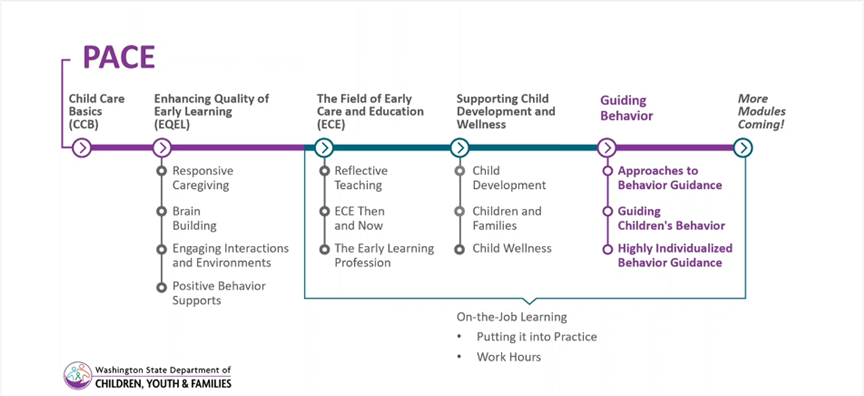Provider Access to a Community Equivalent (PACE) is an option for some ECE roles who need an initial or short certificate (assistant teachers, lead teachers, or family home licensee.) PACE is available at no cost to providers who have chosen this community based option to meet the education requirement for their role. Each PACE Module requires attendance and participation in live, online classes and completion of a workbook and job-embedded learning activities. The PACE training series includes Child Care Basics and Enhancing Quality Early Learning (EQEL) Year 1 and Year 2. Completion of these foundational trainings plus PACE Part 1 and Part 2 are equivalent to the education requirement for the initial certificate. To learn more, review the PACE Program Overview. PACE Part 1 is a 20-hour training series that includes Module 1: Reflective Teaching, Module 2: ECE Then & Now, and Module 3: The Early Learning Profession. After completing Child Care Basics and EQEL Years 1 and 2, providers begin the PACE Modules and On-the-Job Learning. The PACE Part 1 Modules are completed in order, beginning with Reflective Teaching. PACE Part 2 is an additional 20-hour training series that includes Module 1: Child Development, Module 2: Children & Families, and Module 3: Child Wellness. Providers must complete all Modules in PACE Part 1 before beginning PACE Part 2. Completion of PACE Part 1 and Part 2 are equivalent to the education requirement for the initial certificate. PACE Part 3 will be offered in 2024-2025! Providers must complete PACE Parts 1 and 2 before beginning PACE Part 3. Completion of PACE Part 3 and Part 4 will be equivalent to the education requirement for the short certificate. Need help determining if PACE is the right fit for you? Use DCYF’s Guide to Professional Development Plans to learn more about PACE and the other options available. If you need additional assistance, you can also reach out to the MERIT Workforce Registry Support Team, merit@dcyf.wa.gov or 1-866-482-4325 option 5. PACE Part 1, Module 1: Reflective Teaching is the first class in the PACE training series: CCAC will be offering PACE in English and Spanish throughout the year. If you would like to be notified when new classes become available, click here and fill out CCAC’s PACE Contact List. (Please Note: If you’ve already taken PACE classes with Child Care Action Council, we have your contact information and we will email you as soon as the next class in the PACE series becomes available. You do not need to fill out this form.) Child Care Aware will be offering PACE in English and Spanish throughout the year. If you have already completed Part 1, Module 1: Reflective Teaching with Child Care Action Council, you be notified when additionional classes become available. If you have additional questions, please contact Nancy Hobson at Nancy.Hobson@CCACWA.org or (360)786-8907 x100. Si tiene preguntas adicionales, comuníquese con Norma Hernandez en Child Care Action Council, (360) 581-6704 o Norma.Hernandez@CCACWA.org. To receive STARS credit, you will be required to participate in this session by typing comments or participating in surveys, polls, and discussions. As a participant, you must be able to view the instructor and visuals aids. You will not be required to show yourself on camera, but it can be nice to have face-to-face contact. Tips for participating in the class will be emailed to you the week of the training. Requirements: stable internet access, audio via phone or speaker, and an email address. Tracy Goodrich, Susan Burnham, Kim Mather-Schopen, Leea Farrar, and April Westerman FREE to providers who have chosen PACE to meet their education requirements See series dates above Live Online, via Zoom 
Instructors:
Cost:
When
Location